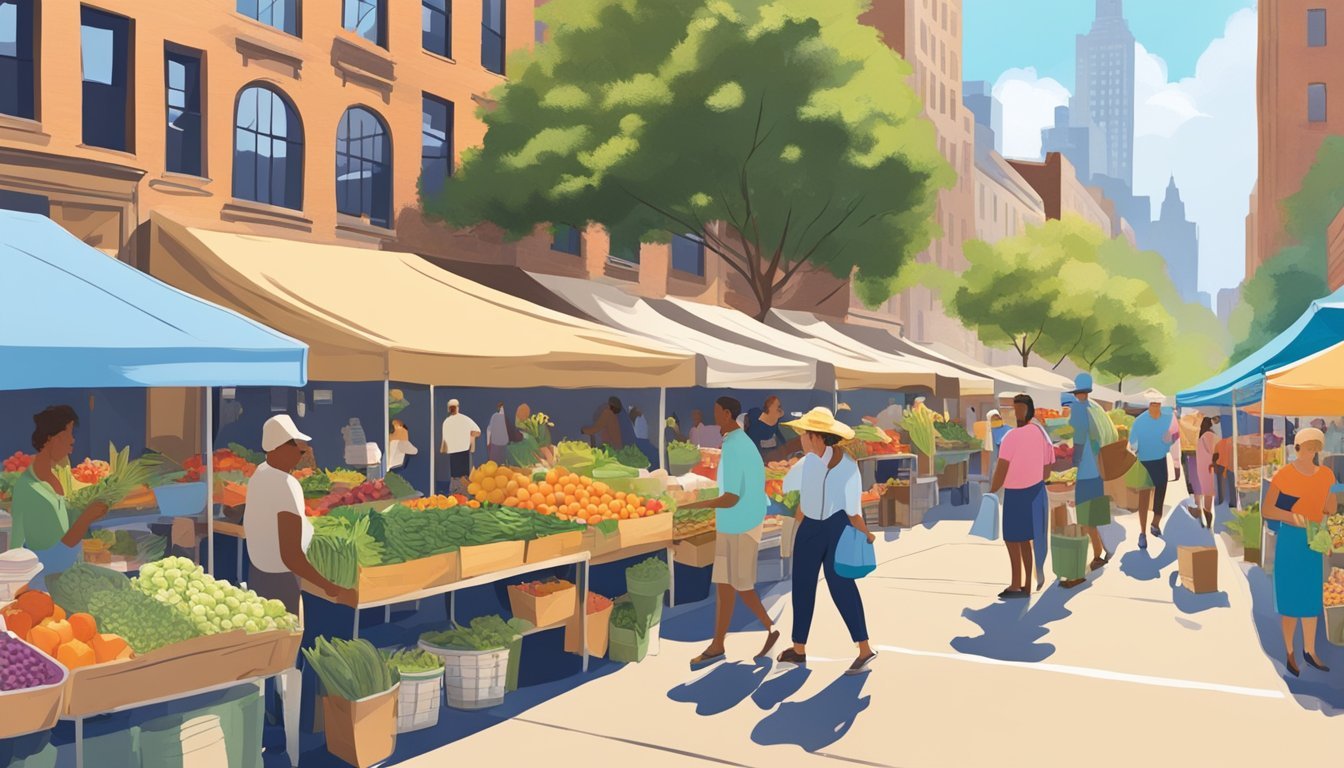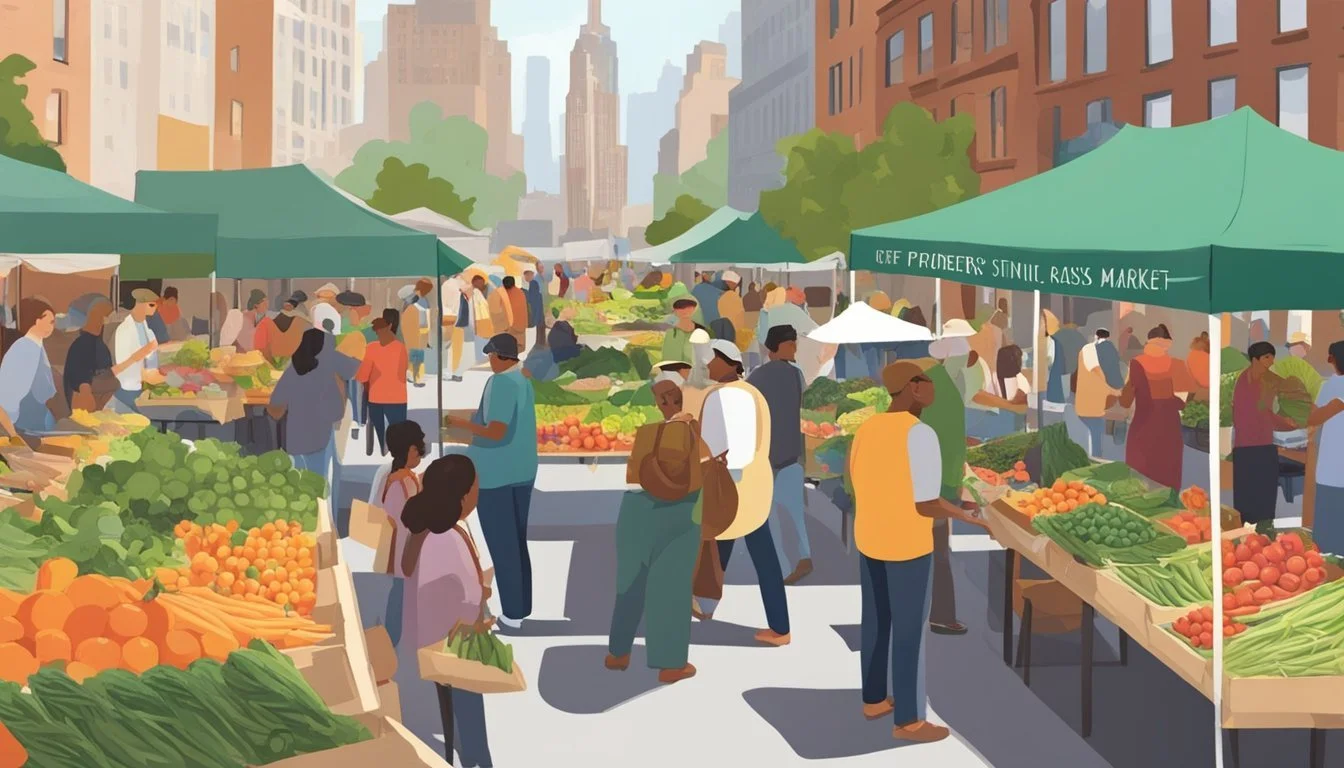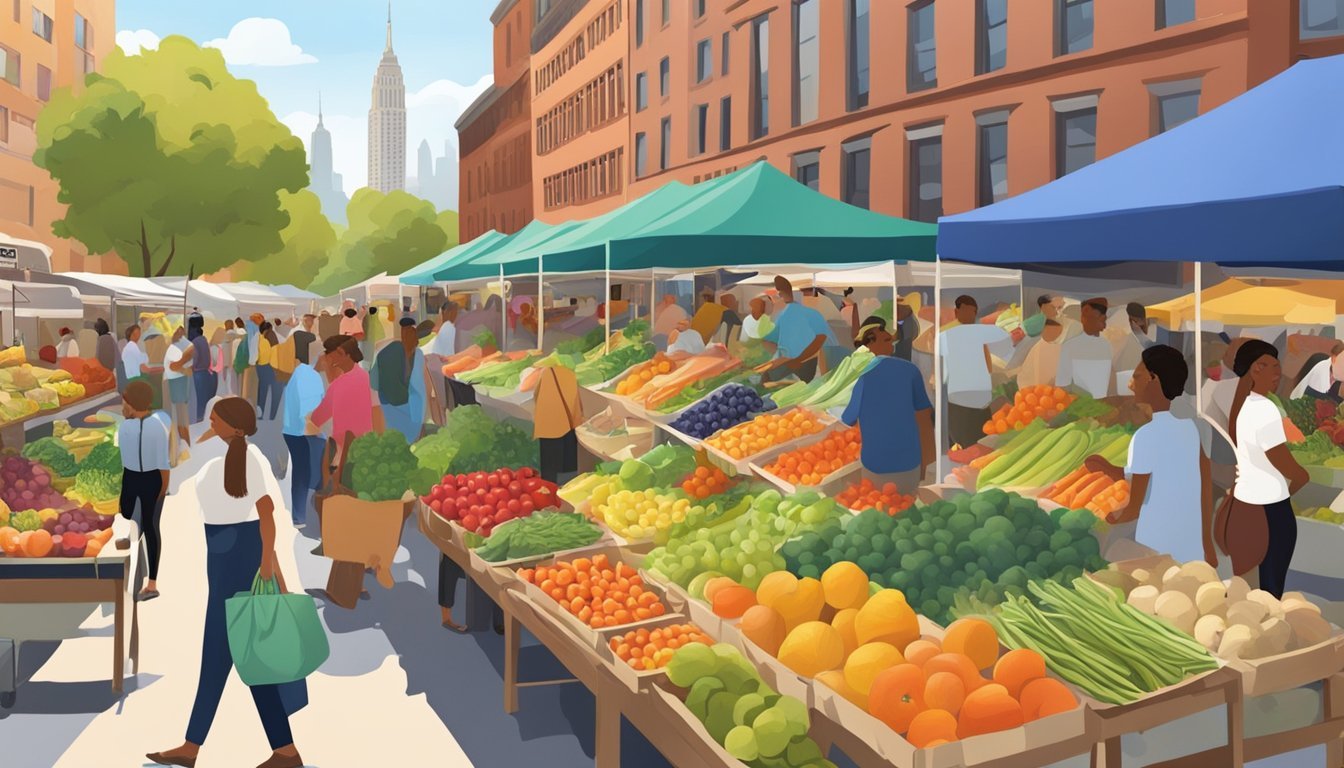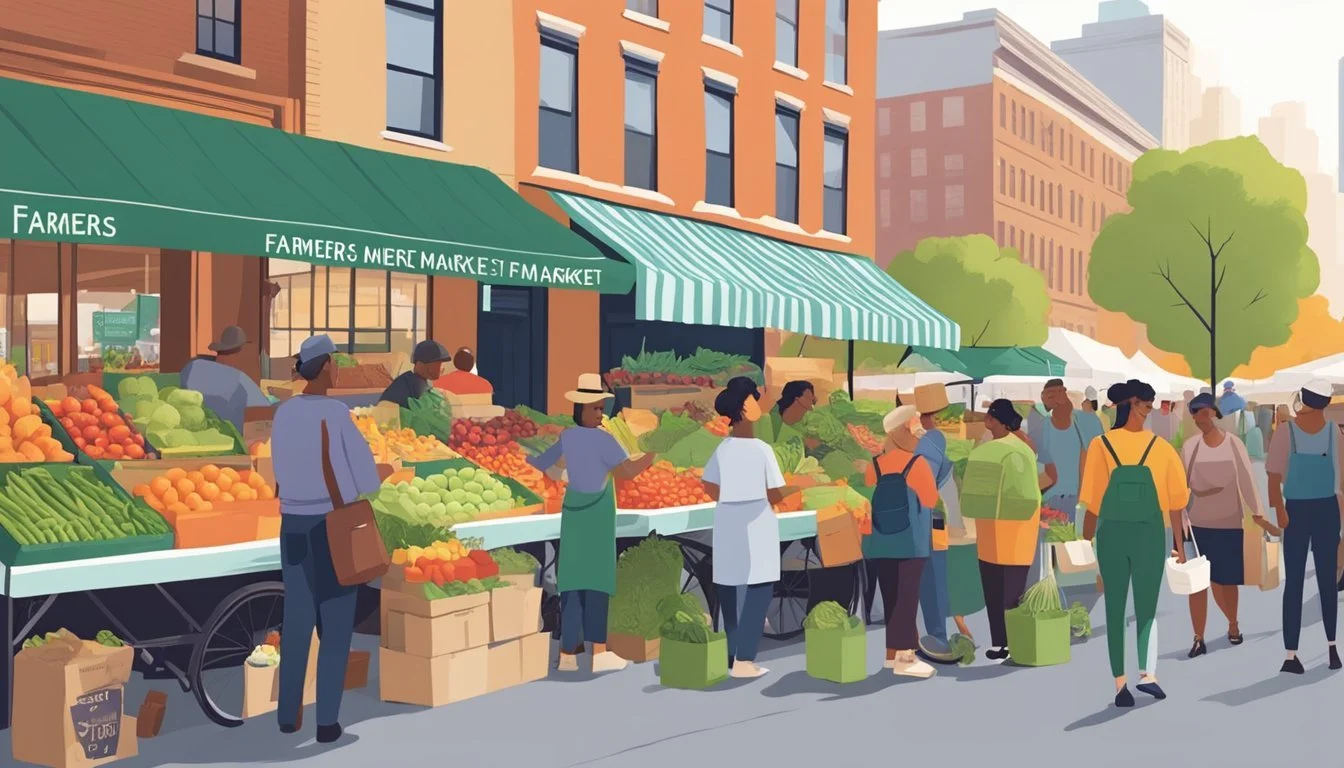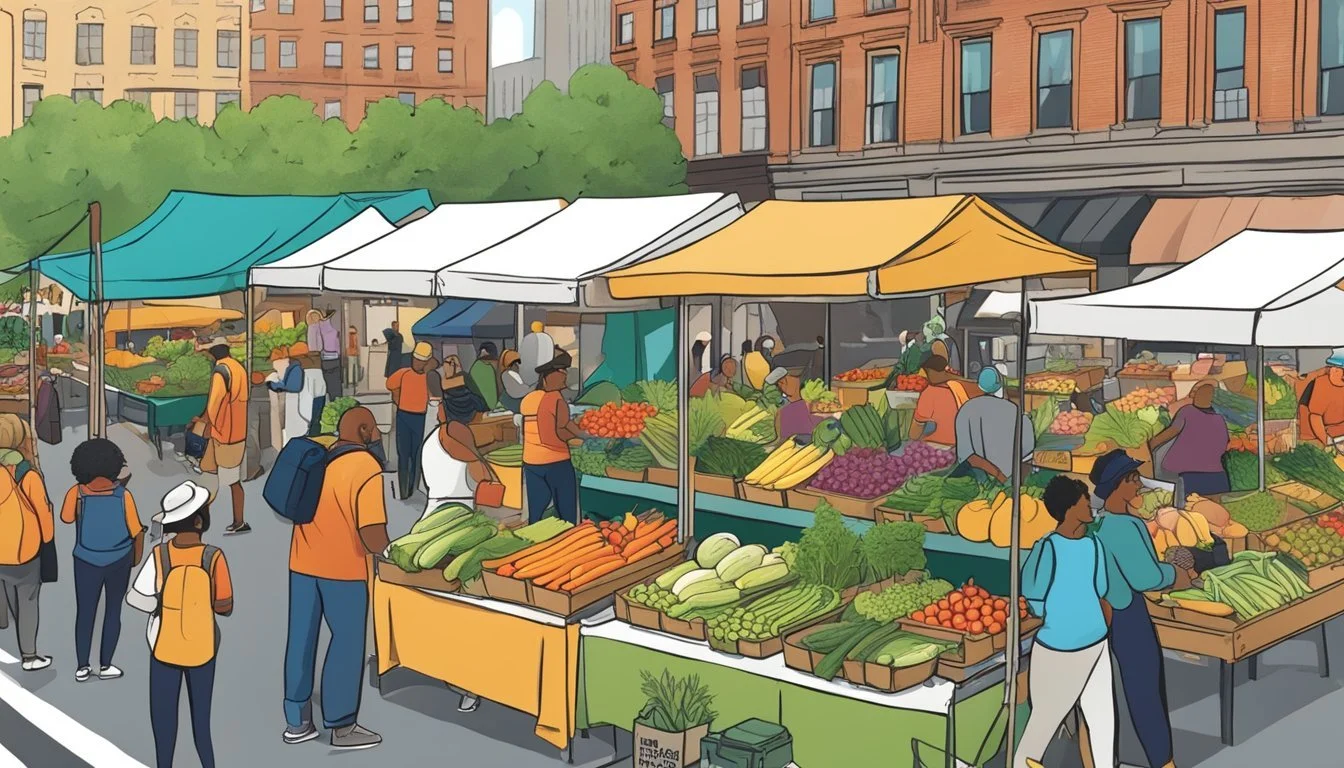Community Supported Agriculture (CSA) in New York City
A Guide to Fresh, Local Produce
Community Supported Agriculture, commonly referred to as CSA, has become an integral part of urban life in New York City. These programs connect consumers directly with local farms, offering them a share in the season's harvest. Members of a CSA purchase a share in advance, thereby providing the farm with much-needed early season capital. In return, participants receive regular distributions of farm-fresh produce, typically on a weekly basis. This model not only supports the financial stability of local farmers but also provides city dwellers with access to fresh, often organic, fruits and vegetables, fostering a closer connection to the source of their food.
In New York City, the CSA model has adapted to the urban environment, creating a robust network that caters to the diverse communities across the boroughs. Programs such as those offered by the Hebrew Institute of Riverdale and the Chelsea CSA, show the versatility of CSA models in addressing the needs of different neighborhoods, including providing discounted shares and season-long payment plans for eligible households. Some New York CSAs have been operating for over two decades, indicating a sustained interest and a successful adoption of the CSA model within the urban setting.
By participating in a CSA, New Yorkers contribute to sustainable farming practices and the local economy. The direct farm-to-consumer pathway minimizes the carbon footprint associated with long-distance transportation of produce. Furthermore, CSA programs often educate members about seasonal eating and may include community engagement activities, thus strengthening the connection between urban residents and the rural areas that surround the metropolis.
Understanding CSA
Community Supported Agriculture, commonly known as CSA, has become a pivotal part of New York City's sustainable food movement. It connects residents directly with local farms, emphasizing fresh produce and community engagement.
Definition and History
CSA stands for Community Supported Agriculture. It is a model where consumers purchase shares of a farm's projected harvest in advance. This system gained traction in New York following the pioneering efforts of Booker T. Whatley, who promoted clientèle membership clubs in the 1960s and 70s. CSA has European roots as well and has been adopted in various regions with the goal of securing a market for local farms and providing fresh, often organic produce to the community.
How CSAs Work
At the beginning of the growing season, members buy a share from a CSA program, providing the farm with up-front capital. The farm commits to supply a portion of its fresh produce to these members throughout the season. The distribution is typically done on a weekly or bi-weekly basis, directly from the farm or through community pick-up points. Share options might include an assortment of vegetables, fruits, eggs, and sometimes other farm products.
Example of CSA Share Structure:
Full Share: Weekly pick-up of produce, suitable for families
Half Share: Pick-up every other week, ideal for individuals or small households
Add-ons: Optional extras like eggs, cheese, or flowers
Benefits of Joining a CSA
Joining a CSA has numerous advantages. Members receive fresh, high-quality products grown by regional organic farms. They also have the satisfaction of supporting sustainable agricultural practices and bolstering the local economy. Furthermore, CSAs foster a strong community bond between consumers and farmers, promoting an awareness of seasonal eating and a deeper connection to the source of their food.
CSA Programs in NYC
New York City's residents have various opportunities to access fresh, locally-sourced produce through Community Supported Agriculture (CSA) programs. These programs connect consumers directly with farms from nearby regions, providing a plethora of fresh produce, dairy, and meat options throughout the city.
Key Players and Farms
New York City's CSAs are supported by a diverse group of farms. Stoneledge Farm, located in the Hudson Valley, is a key supplier for the Chelsea CSA, providing a variety of organic produce. Another significant contributor to NYC's CSA landscape is Norwich Meadows Farm, known for their high-quality organic vegetables. Brooklyn, Manhattan, Long Island, Bronx, and Queens all host various CSA programs, partnering with local farms such as Roxbury Farm from Kinderhook, NY, ensuring that a wide range of New York City neighborhoods benefit from fresh, farm-to-table goods.
Types of Shares Offered
CSA shares typically include a selection of vegetables, fruit, eggs, meat, and occasionally cheese. In NYC, there is an option for every type of household:
Regular/Family Shares: Suitable for families or individuals seeking a full range of produce.
Half/Small Shares: Designed for individuals or small households.
Market-Style Shares: Members pick their produce, providing more flexibility.
Mixed Income Shares: Offered by CSAs like Chelsea CSA to accommodate various income levels.
These shares underscore the emphasis on supporting all community members, providing access to fresh and seasonal produce.
Distribution and Pick-Up
The CSA model is based on pre-arranged pickup locations throughout New York City. Members typically choose a convenient location during sign-up and receive their shares on a designated day of the week.
Pick-Up Location: Farms like Norwich Meadows and Stoneledge facilitate multiple locations in different boroughs.
Home Delivery: Some CSAs offer the added convenience of delivering directly to members' homes.
By ensuring multiple distribution options, CSAs in NYC cater to the varied lifestyles of their members, making locally-sourced food more accessible across the city.
Participation and Support
Participating in a Community Supported Agriculture (CSA) program in New York City offers residents a chance to engage with their community while supporting local agriculture. Payment plans and SNAP benefits involvement are often accommodated to ensure wide access.
How to Join
Individuals interested in joining a CSA program must first select a suitable program in their borough. Registration typically involves an online form or signing up at community events or local farmers' markets. Many CSA programs require upfront payment for the season, but some offer varying payment plans to accommodate different budget levels. Certain programs also accept SNAP benefits, further easing the cost barrier for low-income families.
Community Engagement
CSA programs in NYC are not just about receiving local food; they foster deeper community ties. Members often partake in various events organized by the CSA, ranging from farm visits to cooking classes. Most programs necessitate a certain number of volunteer shifts, enhancing the sense of community ownership and shared responsibility. These activities allow neighbors to connect and collectively contribute to the success of the CSA system.
Supporting Local Agriculture
CSA programs directly support local farmers, often those who practice certified-organic farming, by providing them with a reliable customer base and upfront capital to manage their farms. By becoming a member, individuals aid in ensuring that local farmers can continue supplying fresh, locally grown produce. This support helps maintain a vibrant local farm economy and reduces reliance on long-distance food supply chains.
Seasonal and Operational Aspects
Community Supported Agriculture (CSA) in New York City exhibits distinct operational methodologies tailored to the various seasons, ranging from winter share subscriptions to spring and summer bounty distributions. Adapting to the metropolitan context, CSAs in NYC have crafted innovative approaches to deliver fresh, local food throughout the year.
Seasonal Variations
New York's CSA programs typically operate on a seasonal basis, with spring/summer shares starting from June and carrying on into November. During these months, members receive a plethora of seasonal produce including broccoli, fresh food, and organic vegetables. The winter season generally transitions to offerings like winter squash which can be stored and consumed throughout the colder months. Some CSAs also offer winter share subscriptions, providing a continuity of fresh, local products, albeit with less variety than the warmer months.
Challenges and Considerations
Running a CSA in New York requires addressing certain questions and challenges. Urban settings pose logistical issues, from delivery to storage of perishables. CSA operators need to ensure that there is a consistent supply of fresh food and seasonal produce while managing the demands and expectations of the community. A critical concern is the capacity to maintain supply throughout the unpredictable weather conditions that can affect crop yields.
Innovations in CSA Models
The CSA model in New York has evolved with creative solutions to these challenges. Some CSAs have introduced mix and match options, allowing members more flexibility in their share subscriptions. This enables participants to select preferences within the available seasonal offerings, catering to individual tastes and reducing food waste. Adapting to the local food system, CSAs leverage relationships with multiple farms to diversify their sources, thus enhancing the variety and reliability of produce available to members.
Member Experience
Participating in a CSA in New York City offers members a unique and intimate connection with their food sources. It involves commitment to the agricultural process, consistently fresh and local produce, and an opportunity to enhance one’s cooking repertoire.
Commitment and Expectations
Members, when joining a CSA such as Prospect Park CSA or Inwood CSA, enter a relationship with their local farm, implying a season-long commitment. They share the risks and bounties of farming, which means accepting variations in the weekly harvest. A Full Share typically requires members to pay upfront for an entire season, supporting the farm's operational costs.
Weekly Share Content
Each week, members receive a portion of the farm's harvest, which can widely vary based on seasonal availability. Shares usually include an assortment of vegetables, fruits, and sometimes additional products like eggs or dairy. The content of the shares is farm-fresh, local, and picked at the peak of freshness.
Prospect Park CSA and Inwood CSA might have:
Vegetables: 6-9 types (e.g., tomatoes, carrots, kale)
Fruits: 2-3 types (e.g., apples, berries)
Additional items (choice of eggs, dairy, etc.)
Recipes and Cooking Tips
CSAs often take the initiative to help members make the best use of their weekly shares by providing recipes and cooking tips. For those new to cooking with farm-fresh ingredients, these resources are invaluable, fostering a deeper relationship with food and enhancing cooking skills with items that are both fresh and local.
Recipe Suggestions: Tailored to current week’s harvest
Cooking Tips: Storage instructions, preparation techniques
By adopting a CSA membership, one gets more than just food; they become part of a community that values sustainable agriculture and gains insight into creative cooking methods.
Regional Impact
Community Supported Agriculture (CSA) programs significantly influence the regional economy, environment, and community fabric in New York City and surrounding areas. They establish a symbiotic relationship between local consumers and farmers, providing measurable benefits and strengthening collaborations.
Economic Benefits for Farmers
Farmers in New York State and New Jersey benefit economically from CSA programs through a stable income source and reduced marketing costs. By selling directly to consumers, local farms secure financial support earlier in the season, aiding cash flow when it is most needed for crop production. Local Roots CSA is one such initiative supporting New York farmers by connecting them with urban consumers, thereby guaranteeing sales and fostering financial sustainability.
Environmental and Socioeconomic Effects
CSA programs contribute to sustainable agricultural practices that have a positive environmental impact. By focusing on local produce, the carbon footprint associated with transportation is significantly reduced. Furthermore, farms involved in CSA tend to employ organic farming methods that are better for the soil and local ecosystems. Socioeconomically, these programs make fresh, healthy food more accessible to different communities within NYC, promoting food justice and improving nutrition.
Partnerships and Collaborations
CSAs in New York City thrive on partnerships and collaborations that extend across various sectors. They connect urban consumers with upstate and local New Jersey farms, creating a bridge between rural and urban areas. Institutions such as the Hebrew Institute of Riverdale exemplify how community organizations can support local agriculture, while networks like Just Food expand the impact of CSA programs through education and advocacy, thereby nurturing a robust community-supported agriculture in the region.
Additional Resources
In this section, readers will find a curated list of resources related to Community Supported Agriculture (CSA) in New York City, offering support, education, and valuable connections within the local food community.
FAQs and Support
For individuals seeking answers to common questions regarding CSAs, LocalHarvest provides a comprehensive FAQ section. They can also provide support through email for more tailored questions. Prospective and current CSA members may also find various CSA-centric events which can serve as a support network, helping them to better understand their subscription and community involvement.
Educational Opportunities
Those looking to deepen their knowledge can find educational opportunities such as workshops and learning events through their local CSA programs. Networks like the Hebrew Institute of Riverdale offer a range of events aimed at fostering learning and community engagement around agriculture and sustainable practices.
Directories and Networks
To connect with CSA programs in New York City, directories such as the one offered by LocalHarvest are invaluable. They allow people to find CSAs by location, providing essential contact information and details about each program. Participating in these networks enhances the sense of community and keeps people informed about local food roots and initiatives.
LocalHarvest Directory Example:
Roxbury Farm | Location: Kinderhook, NY | Email: contact@roxburyfarm.com | Description: One of the largest CSAs in the Northeast, with a focus on sustainable farming and community connection.

